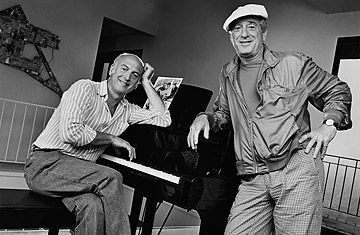
Songwriters and producers Jerry Lieber, right, and Mike Stoller pose during a portrait session in Beverly hills in 1980. The duo worked with Elvis and other famous pop musicians, and penned hits including "Stand By Me," and "On Broadway."
(2 of 3)
A later, greater Coasters hit, the 1958 "Along Came Jones," was inspired by the them-current glut of TV Westerns, and took its title from a 1945 Gary Cooper movie, but Leiber's cliffhanger scheme was indebted to the Saturday-matinee serials he must have seen as a child:
I plopped down in my easy chair and turned on Channel 2.
A bad gunslinger called Salty Sam was a-chasin' poor Sweet Sue.
He trapped her in the old sawmill and said with an evil laugh,
[Bass voice:] "If you don't give me the deed to your ranch, I'll saw you all in half!"
And then he grabbed her ([tremulous falsettos:] and then?)
He tied her up (and then?)
He turned on the buzz saw (and then? and then?)
Aah-aah
And then along came Jones,
Tall thin Jones,br>
Slow-walkin' Jones,
Slow-talkin' Jones,
Along came long, lean, lanky Jones.
Often, though, the peril was scarier than any movie fantasy. In the Robins' "Framed," the narrator is picked up by cops, fingered by a stool pigeon, railroaded by the prosecuting attorney. It's lumpen tragedy amped up to farce level, but with an implicit warning for their black listeners: life's not fair to the underclass. As Leiber says in the book What'd I Say, a history of Atlantic Records, "A lot of this had to do with being a white kid's take on a black person's take on white society."
At the time, Leiber and Stoller were among the few white songwriters working the black side of the segregated music business. But as the rock broke through the color barrier with crossover hits by Fats Domino, Chuck Berry and Little Richard in 1955-56, Leiber started writing Coasters lyrics for a new underclass: the white teenager. Now any authority figure, parent or teacher, was "the man," making life miserable for kids. The class cutup in "Charlie Brown" wonders, "Why is everybody always pickin' on me?" In "Yakety Yak" a parent barks out orders: "Take out the papers and the trash, / Or you don't get no spendin' cash. ... / Tell all your hoodlum friends outside/ You ain't got time to take a ride." And when a chorus of kids shouts, "Yakety Yak," the bass-voiced father barks, "Don't talk back."
There weren't many June moons in the lurid Leiber landscape; it was a night town of train wrecks ("Black Denim Trousers and Motorcycle Boots"), knife fights ("Smokey Joe's Cafe") and countless jailbreaks. To the propulsive musical setting Stoller wrote for Elvis's "Jailhouse Rock," with its immortal opening salvo of guitar, then drums, Leiber provides a jaunty wit and possibly the first gay come-on in rock history — "Number 47 said to Number 3 / That you're the cutest jailbird I ever did see" — unless the facility is coed. But that's a happy-Hollywood version of "Riot in Cell Block #9," which L&S wrote for the Robins in 1954:
The warden said, "Come out with your hands up in the air.
If you don't stop this riot, you all gonna get the chair."
Scarface Jones said, "It's too late to quit.
Pass the dynamite — cause the fuse is lit."
There's a riot goin' on,
There's a riot goin' on,
There's a riot goin' on
In cell block #9.
DRIFTING TO HEAVEN
Then Leiber and Stoller turned around and masterminded the lushest, most romantic and inventive music that rock had yet heard: the Drifters' songbook. The group had been evolving for almost a decade and had some hits (a doo-wop "White Christmas") with front-man Clyde McPhatter. The new lead singer, Ben E. King, wrote a song called "There Goes My Baby," which is still one of pop's weirdest records: a standard doo-wop lament that has four violins and a cello sawing away (a jarring innovation back then) and, like a distant war drum, a timpani that no one knew how to tune and so hits one note no matter what the chord change. When Atlantic Records co-chairman Wexler first heard this bizarre melange, he was more than disappointed — he was furious. "It sounds like three stations playing at the same time coming through on one very bad car radio," he fumed, insisting that the number be junked. Ertegun overruled him, and "There Goes My Baby" was a top-five pop and R&B hit.
"We don't write songs," Leiber and Stoller have often said. "We write records." The declaration underlines their roles as producers; and over the next five years, while managing an ever-drifting roster of Drifters personnel, Leiber and Stoller made gorgeous records. They got three particularly inventive pieces from songwriters Doc Pomus and Mort Shuman: "This Magic Moment," "Save the Last Dance for Me" and the can-never-be-played-too-often "Sweets for My Sweet." L&S also encouraged the young songwriters in Broadway's Brill Building — Gerry Goffin and Carole King ("When My Little Girl Is Smiling," "Some Kind of Wonderful"), Barry Mann and Cynthia Weil ("On Broadway"), who were all in their late teens or early 20s — to write plangent pop ballads. These were the Broadway songs that Broadway couldn't bring itself to write.
